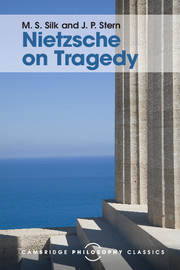Book contents
- Frontmatter
- Dedication
- Epigraph
- Contents
- Preface to this edition
- Preface
- Note
- 1 Germany and Greece
- 2 Biographical background I: Nietzsche and his early interests
- 3 Biographical background II: the genesis of The Birth of Tragedy
- 4 The argument of The Birth of Tragedy
- 5 The aftermath
- 6 Nietzsche's account of Greece
- 7 Mode and originality
- 8 Tragedy, music and aesthetics
- 9 Nietzsche and earlier German theories of tragedy
- 10 Style and philosophy
- Bibliography
- Index
2 - Biographical background I: Nietzsche and his early interests
Published online by Cambridge University Press: 05 August 2016
- Frontmatter
- Dedication
- Epigraph
- Contents
- Preface to this edition
- Preface
- Note
- 1 Germany and Greece
- 2 Biographical background I: Nietzsche and his early interests
- 3 Biographical background II: the genesis of The Birth of Tragedy
- 4 The argument of The Birth of Tragedy
- 5 The aftermath
- 6 Nietzsche's account of Greece
- 7 Mode and originality
- 8 Tragedy, music and aesthetics
- 9 Nietzsche and earlier German theories of tragedy
- 10 Style and philosophy
- Bibliography
- Index
Summary
Life and classical career
The main external events in Nietzsche's life that concern us here are easily summarized. Friedrich Wilhelm Nietzsche was born in 1844 into a pious Protestant family at Röcken in Saxony. His father, the local parson, died in 1849, leaving, in all, three children, one of whom died shortly afterwards. The survivors were Nietzsche himself and a younger sister. This sister, Elisabeth, was to count for a good deal in Nietzsche's later life, favourably and otherwise: she eventually became the custodian of all his surviving works during the long period of incapacity that preceded his death and continued in that influential rôle, which she executed in a highly questionable way, for thirty-five years afterwards.
In 1850, with his mother, sister and – to add to the regiment of women – two aunts and a grandmother, Nietzsche moved to nearby Naumburg. He soon showed academic promise and in 1858, at the age of fourteen, went to the famous boarding school of Pforta, not far from Naumburg, where he excelled in most subjects, the chief exceptions being art and mathematics. The standing of this school, established in 1543 and before that a Cistercian Abbey, was considerable. Its distinguished pupils over the years had included such famous names in German cultural life as Klopstock, Fichte, Ranke, and Friedrich Schlegel; and not the least of its products was a series of remarkable classical scholars, beginning with Ernesti in the early eighteenth century and proceeding through Böttiger, Thiersch, Doederlein, Dissen, Meineke, Otto Jahn, Nauck, Breitenbach, Bonitz and Wachsmuth to the illustrious Wilamowitz, four years Nietzsche's junior.
Classics was also to be Nietzsche's chosen profession and his rise in it was rapid. From Pforta in 1864 he went to the University of Bonn to read classical philology and theology, but he stayed only for a single year. A bitter personal feud had developed there between the two eminent classics professors, Otto Jahn (like Nietzsche from Pforta) and Friedrich Ritschl; and in 1865 Ritschl left, followed by some of his students, to take up a post at the University of Leipzig. Nietzsche was among those who went with Ritschl; and under Ritschl at Leipzig his career blossomed.
- Type
- Chapter
- Information
- Nietzsche on Tragedy , pp. 17 - 35Publisher: Cambridge University PressPrint publication year: 2016

